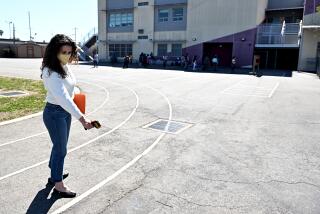County Rejects Pepperdine Plan for Water Disposal
- Share via
The Los Angeles County engineer has turned down Pepperdine University’s waste-water disposal plan, a key element in a proposed expansion program for the Malibu campus.
County officials have indicated that they would not approve Pepperdine’s overall development plan to double in size unless the university assured them that the additional waste water produced would not seep into the ground and cause geological problems.
A natural landslide exists on Malibu Road, an area below the campus that is lined with expensive beachfront homes. Experts for the county and the homeowners fear that the landslide would be aggravated if too much of Pepperdine’s treated sewage water percolates into the soil and enters the ground water.
Pepperdine treats its waste water in its own sewage plant and then sprays the effluent on several grassy fields around the campus. The university has contended that this method, known as spray irrigation, is safe.
Loss of Control
But according to Brian Scanlon, sewer maintenance superintendent for the Department of County Engineer-Facilities, Pepperdine’s plan contained “too many uncertainties.” Chief among them was the question of how much of the sewage water might “deep percolate,” or penetrate the ground beyond the root zone, and raise the ground-water level.
“In areas with landslides, (the effect) could be adverse,” Scanlon said. “Once the stuff deep percolates, you lose control of that water. We have to know how much of the water can be accounted for and then how they’re going to pull it out.”
Scanlon said Pepperdine will have to consider alternative methods of disposing of its waste water, such as a creek discharge or hookup to a regional sewer system. Malibu does not have such a system, although county officials have been studying the feasibility of installing one for years.
Andrew K. Benton, Pepperdine assistant vice president, said that the county’s concerns were legitimate and that university officials will consider the changes that were proposed.
But he suggested that the county engineer’s decision was influenced by the legal morass created by the Big Rock Mesa landslide. Homeowners there have sued the county, alleging that it is responsible, and the county has countersued, arguing that the residents’ negligence led to the sliding.
Excessive Watering
“The county is facing severe ramifications from Big Rock,” Benton said, “and so the engineer is proceeding with great care.”
Rejection of Pepperdine’s waste-water disposal method, contained in a document called the Spray Irrigation Management Plan, further delays the university’s expansion program, which proposes building enough new dormitories and classrooms to accommodate 5,000 full-time students, twice its current enrollment.
In order to serve the additional students, faculty and staff, Pepperdine needs to enlarge its sewage plant to handle 500,000 gallons of waste water a day. Benton said the plant expansion is urgent because the facility already is operating at capacity, treating 200,000 gallons a day. An additional 40,000 gallons a day is being processed by the Las Virgenes Municipal Water District.
These plans have caused considerable controversy in Malibu, where many residents believe that new development would increase traffic and destroy the natural beauty of the area.
Greg Aftergood, attorney for the Malibu Road Property Owners Assn., said there is some indication that the amount of waste water Pepperdine is spraying on the ground may be excessive. He said the homeowners group wants Pepperdine to monitor the irrigation to be sure that the ground water does not reach a dangerous level and exacerbate the existing landslide.
He said that if Pepperdine is going to continue using the irrigation method, it will either have to “get a lot more land” to absorb the treted sewage water or explore alternatives, such as connecting to a regional sewer system when it is built.
Pepperdine’s belief that it can dispose of more than 200,000 gallons of waste water a day by the spraying method was “overly optimistic,” Aftergood said. “From that standpoint, we’re pleased the county finds the same faults with the spray irrigation plan that we have.”
More to Read
Sign up for Essential California
The most important California stories and recommendations in your inbox every morning.
You may occasionally receive promotional content from the Los Angeles Times.














